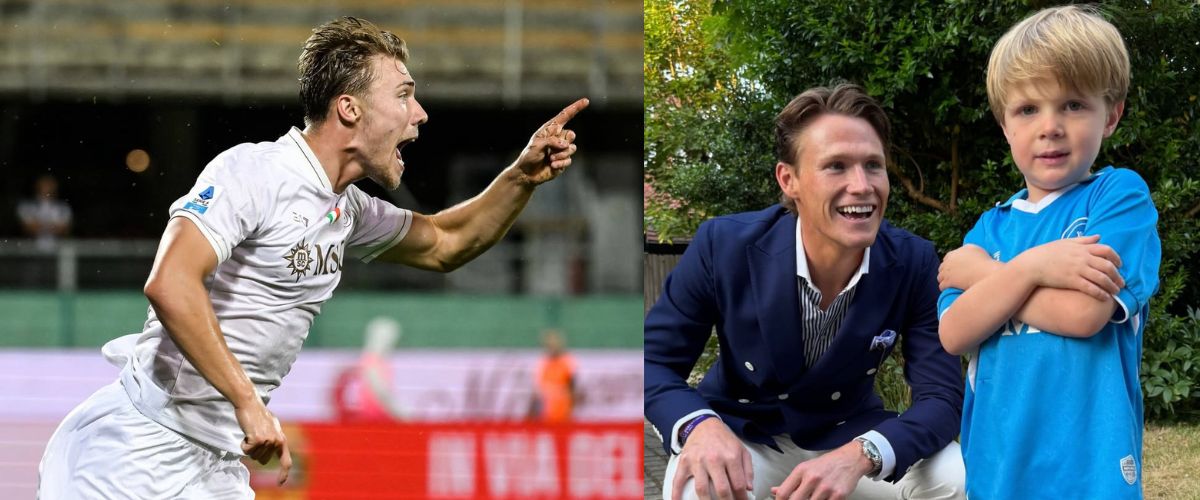It’s a cozy Sunday night and I’m tuned into the World Cup qualifiers. First, Scott McTominay bags a late winner for Scotland against Belarus. Then Rasmus Højlund opens the scoring for Denmark. Both have left Manchester for Naples and honestly, their glow-ups are something I need to study.
Introduction: two players, two journeys, one universal truth
Scott McTominay and Rasmus Højlund. Two names that will forever be on good terms with my memory as a lifelong Manchester United fan. One, a homegrown scottish warrior who bled red from the academy days. The other, a danish wonderkid who arrived with the weight of Old Trafford’s salvation on his young shoulders 2 years ago. Both gave everything they had to the shirt. Both were tested, criticized and at times broken by the constant pressure that comes with representing one of football’s most famous clubs. In the last couple of months as I watch McTominay dominate for Napoli and competing for the Ballon d’Or and see Højlund rediscovering his spark in Serie A, I don’t feel sadness or loss, but pride and positivity. Pride that these boys, who wore United’s badge with honor even when the world doubted them, are finally showing everyone what we always knew they were capable of. Their transformations aren’t just about football, it’s about resilience, mental health, some pasta with tomato sauce, sunny days instead of constant gloomy weather and the courage to choose yourself when the environment becomes unbearable.
This is their story. But it’s also a story about what happens when talented individuals are placed in toxic systems and what blooming looks like when they finally break free.
The weight of the badge in Manchester United’s darkest era
Being a Manchester United fan over the past decade hasn’t just been difficult, it’s been emotionally exhausting. The club I fell in love with, the one that represented excellence, courage and unwavering belief has felt like a shadow of itself. The badge still carries history and prestige, but the atmosphere surrounding it has been like.. shit. Since Sir Alex Ferguson’s retirement in 2013, we’ve cycled through managers, philosophies and transfer strategies with exhausting inconsistency. David Moyes, Louis van Gaal, José Mourinho, Ole Gunnar Solskjær, Ralf Rangnick, Erik ten Hag. Each promised renewal, each eventually became another chapter in our decline. Our football has been disjointed, the dressing room has leaked more stories than a british tabloid. Worst of all, the expectations have remained sky-high while the supporting structures have slowly crumbled during the last 12 years. For the players caught in the crossfire, the psychological toll has been immense. Every pass is scrutinized. Every loss triggers a media feeding frenzy. Social media abuse has become normalized. The Old Trafford crowd, once a fortress of support has turned on its own, booing players who are clearly struggling mentally and emotionally.
This isn’t the environment where talent flourishes, it’s where confidence dies. It’s where young players learn to play scared, where experienced professionals second-guess their instincts, where the joy of football gets replaced by the dread of making mistakes. And these two lived through the worst of it.
Scott McTominay: the homegrown heart who never stopped fighting
Scott McTominay has always been a huge debate among United fans. To his critics, he represented everything wrong with the club’s post-Ferguson mediocrity. A limited midfielder who wouldn’t start for any of our title winning teams, someone who was only in the squad because he came through the academy during our weakest period. To those of us who truly watched him, though? Scott was something different. He was relentless, the actual example of pure, unfiltered commitment. The kind of player who’d run through walls for the badge, who’d play through injuries, who’d score crucial goals when we needed them most and who never, not once, hid when things got tough.
But here’s what people don’t talk about enough: the psychological warfare of being constantly told you’re not good enough while simultaneously being relied upon game after game. Scott played over 250 matches for Manchester United. He scored important goals against Manchester City and in European competitions, couple of times he captained the team. Yet every week, the narrative was the same, he’s just not United quality. Imagine going to work every day, giving everything you have and being told by millions of people that you’re the problem. That you’re holding the team back. That your best isn’t good enough. Now imagine doing that at 23, 24, 25 years old, under the microscope of global media attention.
The mental resilience required him to keep showing up, to keep fighting, to keep believing in yourself when the world has written you off and that’s not weakness. That’s extraordinary strength and Scott showed that strength for years. I’ve been through some shit man, but this guy, probably he’s stronger than 99% of the current players on the pitch worldwide.
The Scottish Warrior unleashed
Now look at him in Naples. The nice weather, some pasta, some pizza and the mighty tomato sauce does wonders, doesn’t it? Playing for Antonio Conte, one of the most demanding managers in world football, thriving in Serie A, a league that supposedly punishes technical limitations. Scoring goals, dominating midfields and most importantly, smiling again. Watch his performances for Scotland and you see a player transformed. Confident. Commanding. Free. He plays with his chest out, makes forward runs without hesitation and leads his national team with genuine authority. The “limited” midfielder suddenly looks complete. The “not technical enough” player is outplaying Serie A veterans. He got shortlisted for the Ballon d’Or ffs. Look at him now, Don Scott, led Napoli to the Scudetto, amazing.

What changed? Not his ability, that was always there. What changed was the environment, he’s no longer playing under the crushing weight of being “not good enough for United.” He’s playing for coaches and fans who believe in him, who see his strengths rather than obsessing over perceived weaknesses. The mental liberation is visible in every touch, every tackle, every celebration. As a United fan, watching Scott’s best version doesn’t hurt. It validates everything I believed about him. He wasn’t the problem, the environment was and I’m so incredibly proud that he’s finally getting the recognition he always deserved.
Rasmus Højlund: the boy who carried a club’s hopes too soon
When Rasmus Højlund signed for Manchester United in the summer of 2023, he was 20 years old with one season of top-flight experience at Atalanta. Talented? Absolutely. Raw? Sure. Ready to be the sole striker for a club in crisis, expected to deliver goals while the entire team struggled to create chances? That was never fair. But fairness doesn’t exist in modern football, especially not at Manchester United. Rasmus was thrown into a team that couldn’t score, playing under a manager fighting for his job, with fans desperate for any sign of hope. Every match became a doubt on his ability. Every miss became a headline. Every blank gamesheet fueled the “£72 million flop” narrative.
The psychological destruction of public failure
What people outside football don’t fully get is how destructive constant public criticism is to young athletes’ mental health. Rasmus wasn’t just dealing with normal pressure, he was experiencing failure in the most visible, most amplified way possible. He’d miss a chance and within minutes, social media would explode with abuse. Pundits would question the transfer decision, fans would compare him to strikers at rival clubs. He’d open his phone and see thousands of people telling him he wasn’t good enough, that he’d ruined their weekend, that he should never wear the shirt again. The worst part? He was trying so hard. You could see it in his body language, the desperation in his runs, the frustration in his celebrations when he did score, the weight on his shoulders every time he stepped on the pitch. The joy of playing football, the thing that made him fall in love with the game as a child in Denmark, was being systematically extracted from him. By the end of his first season, Rasmus looked lost. The bright-eyed wonderkid had been replaced by someone who seemed scared to shoot, scared to make mistakes, scared to be himself. He was experiencing what psychologists call performance anxiety. A state where fear of failure becomes so overwhelming that it actually prevents success. Just look at this video against Wolves:
When you’re constantly afraid of being judged, several things start happening to your brain and body. Your mind becomes preoccupied with avoiding mistakes rather than just playing naturally, your muscles tighten up, making your movements stiff and awkward. You overthink everything, which kills the instinct that made you good in the first place and worst of all, every error starts feeling like proof that you’re not good enough, rather than just a normal part of learning. Rasmus was showing all of these signs. His first touch, which had been so clean at Atalanta, became heavy, his finishing, once so instinctive, looked forced. He’d hesitate in moments where young strikers should be aggressive and fearless, the confidence that defined his game had completely evaporated. I remember watching him during those months and just feeling heartbroken. This wasn’t about talent or effort, this was a kid drowning in pressure he was never prepared to handle and the environment around him was too chaotic to throw him a lifeline.
The return of the real Rasmus
Fast forward to now and something has shifted. Rasmus followed Scott to Naples on loan and whether it’s a change in management approach, reduced pressure, or simply time to adapt, we’re starting to see glimpses of the real Rasmus Højlund again. The smile is back, the runs are more confident, the goals are coming, under a usually very demanding Conte. Most importantly, he looks like he’s enjoying football again. When a young player rediscovers joy in their game, everything changes. The technical ability was always there, it just needed space to breathe, space to make mistakes without catastrophic consequences, space to be 21 years old and still learning. Watching Rasmus to score goals in Naples and in his national team now feels different than watching him score in those desperate United months. Back then, his goals felt like momentary relief from drowning. Now, they feel like freedom, like redemption, like proof that the problem was never him. It was the impossible situation he was placed in.
The psychology of toxic football environments
Football, at the highest level, always involves pressure. Elite athletes are conditioned to perform under stress, it’s part of what makes them elite. But there’s a huge difference between productive pressure that pushes you to be better and toxic pressure that slowly destroys you from the inside. At healthy clubs, pressure comes with support. Yes, expectations are high, but players feel backed by their manager, supported by teammates and given room to develop, mistakes are learning opportunities, bad games are analyzed and improved upon and young players are protected and gradually introduced to bigger responsibilities. At dysfunctional clubs (and Manchester United has been dysfunctional for years), pressure comes without adequate support. Players are blamed publicly by managers, internal leaks create paranoia in the dressing room, young players are thrown into roles they’re not ready for because of poor squad planning and every mistake becomes a media circus. The difference between these two environments is everything. One builds players up, the other breaks them.
The mental health crisis nobody wants to talk about
We’re finally starting to have honest conversations about mental health in football, but we’re still barely scratching the surface. Players like Dele Alli, Danny Rose and Andrés Iniesta have spoken courageously about their struggles with depression, anxiety and psychological trauma. The truth is, professional footballers face unique mental health challenges that most people don’t think about. Their entire self-worth gets tied to how they perform on the pitch. Every bad game feels like personal failure. Millions of people feel entitled to critique their every action, often with brutal hostility on social media. Despite being surrounded by teammates and staff, the pressure can feel profoundly lonely and on top of that, there’s the constant uncertainty. One injury, one loss of form, one managerial change can completely derail a career. Players are constantly being compared to their peers, especially in the social media age where every performance is instantly analyzed and ranked.
When all of these pressures exist inside a toxic club environment, the mental health impact gets worse and worse. Players can’t escape the criticism by leaving the stadium. It follows them home, onto their phones, into their sleep. For young players like Højlund or McTominay, who are still figuring out who they are as people, this can be absolutely devastating.
How mental struggle shows up in physical performance
Here’s something most fans don’t realize. Psychological stress directly impacts how your body performs. When athletes are anxious or depressed, their reaction times slow down. Their coordination suffers because fine motor skills need mental clarity. They get injured more easily because stress hormones mess with recovery and they fatigue faster because mental exhaustion translates to physical exhaustion. Even pain hurts more when you’re struggling mentally. Look back at McTominay and Højlund during their toughest periods at United and you’ll see these patterns everywhere. Scott seemed to pick up more injuries, Rasmus looked physically heavy, like he was running through mud even though we knew he was fit. This wasn’t laziness or lack of conditioning, it was their bodies responding to the weight of psychological distress. When your mind is drowning, your body follows. It’s that simple and that brutal.
What leaving a toxic environment really means
There’s this damaging narrative in football culture that leaving a big club represents failure. That “real” players would fight through anything, that moving on is quitting, that loyalty means staying no matter what. This mentality isn’t just wrong, it’s dangerous. Leaving a toxic environment isn’t weakness, it’s self-preservation. It’s recognizing that your mental health, your development and your happiness matter more than stubbornly staying somewhere that’s destroying you. It’s choosing growth over suffering, it’s choosing life over slow death.
Scott McTominay leaving United for Napoli wasn’t an admission that he wasn’t good enough. It was an intelligent career decision by someone who understood himself and what he needed. He recognized that his development had stalled, that the environment wasn’t bringing out his best and that a fresh start in a different league with a world-class manager could unlock a new level in his game. That’s not quitting, that’s courage, big balls, nothing else.
For Højlund, the decision to join Napoli on loan was the breathing room he desperately needed. Away from the suffocating pressure of Old Trafford, playing under Conte alongside McTominay, he’s finally getting the chance to rediscover himself. And from everything we’re seeing, he’s likely to make that move permanent. That’s not abandoning United that’s, just to emphasise again, choosing life over slow death.
The parallel to my own life
I know the feeling all too well because I’ve been there myself. I’ve left jobs where I was constantly undervalued, where my efforts went unnoticed and the culture was toxic. I’ve walked away from relationships that had become one-sided, where support was replaced by criticism and I couldn’t even remember the last time I felt truly appreciated. I’ve stepped back from friend groups that made me feel small instead of celebrated, where I was always the one being judged rather than supported. I stayed in these situations for a while, for loyalty, fear of change, hope that things might improve, concern about what others would think, the sunk cost of time invested. But deep down, I knew the truth. Some environments just aren’t compatible with your wellbeing, no matter how hard you try to make them work and leaving, as hard as it was, became the only way to reclaim my energy and my sense of self.
McTominay and Højlund teach us that recognizing this isn’t failure, it’s clarity. Acting on it isn’t selfishness, it’s self-respect. And the glow-up that can come afterward isn’t about proving people wrong or getting revenge, it’s validation that we deserved better all along.
Why fresh starts actually work
Psychology backs up what we see in these players’ transformations. When you change environments, especially from a toxic one to a healthier one, several powerful things happen in your brain and behavior. First, you get a cognitive reset. The negative thought patterns you learned in the old place start to fade. You’re not constantly reminded of past failures because nobody in the new place was there to witness them. Your brain literally gets to start fresh. Second, you get to reconstruct your identity. In the old place, you were defined by your struggles and shortcomings. In a new place, you get to show people who you really are without that baggage. For McTominay, he’s no longer “the academy player who isn’t quite good enough.” He’s “Conte’s Scottish midfielder who’s adapted brilliantly to Serie A.” That narrative shift is incredibly powerful. It changes how others see you and, more importantly, how you see yourself. Third, your brain itself changes. Novel experiences and new challenges literally alter brain structure in positive ways, enhancing learning and adaptation. Moving somewhere new forces growth in ways that staying comfortable never can. Fourth, you often find better social support. New teams and communities can provide the acceptance and encouragement that was missing in the toxic environment. Sometimes all it takes is people who actually believe in you to unlock your potential.
Finally, past struggles don’t follow you with the same intensity. Yes, people might know your history, but it doesn’t define you in the new place the way it did in the old one. You’re given the benefit of the doubt, a clean slate, a chance to prove yourself without the weight of accumulated disappointments. All of this is why we’re seeing McTominay and Højlund absolutely thrive in Naples. It’s not that they suddenly became better players overnight. It’s that they finally found an environment where their actual abilities could shine through without all the noise and negativity blocking them.
The pride of watching them thrive
As a lifelong Manchester United supporter, I’ve experienced every emotion this beautiful, frustrating club can offer. I’ve celebrated trebles and endured seasons that felt endless. I’ve idolized legends and defended players the world had written off. My identity as a United fan runs deeper than football. It’s about values, about believing in people, about standing by those who give everything for the badge even when it’s not enough. Watching Scott McTominay and Rasmus Højlund go through their struggles at United genuinely broke my heart. Not because they were costing us games, though sometimes they did, as all players do, but because I could see what it was doing to them as people. I could see Scott’s shoulders slump when the Old Trafford crowd groaned at a sideways pass. I could see Rasmus’s confidence evaporate after each miss became a social media pile-on. I could see the joy being drained from them week by week.
But now, watching them rediscover themselves? That fills me with a pride that’s hard to put into words. It’s not the pride of trophy success or transfer vindication. It’s the pride of seeing players I care about escape something that was hurting them and find joy again. It’s the pride of knowing that the faith we had in them wasn’t misplaced, just ahead of its time.
They carried United when united couldn’t carry them
Both of these players gave everything to Manchester United during some of our darkest years. Scott made over 250 appearances, scored crucial goals in massive games and represented the club with dignity even when he was the designated scapegoat for systemic failures that had nothing to do with him. Rasmus arrived almost as a teenager and tried to be our savior when he should have been protected, nurtured and developed gradually. They didn’t fail us, in so many ways, Manchester United failed them. The club, the environment, the structure, it all failed to provide what these talented players needed to reach their full potential. The support wasn’t there, the patience wasn’t there, the stability wasn’t there and yet they never complained publicly, never downed tools, never disrespected the shirt. That loyalty deserves to be honored and the best way to honor it is to celebrate their success wherever it comes. Whether in Naples, Manchester, or anywhere else their careers take them, they’ve earned our support forever.
The universal truth about potential
McTominay and Højlund’s transformations prove something fundamental that people forget too easily. Potential is not fixed and struggling in one environment doesn’t define your ability. The narrative that “good players succeed anywhere” ignores the massive reality of how much context matters in performance. Lionel Messi struggled in his first season at PSG. Not because he suddenly became a bad player, but because the environment wasn’t right for him. Kevin De Bruyne was deemed not good enough for Chelsea before becoming one of the Premier League’s greatest midfielders at Manchester City. Mohamed Salah had to leave Chelsea to become one of the world’s elite attackers at Liverpool.
Football is full of players who bloomed after leaving situations that couldn’t nurture them. Some needed different tactics. some needed different coaching styles, some needed to escape toxic atmospheres. Some just needed to be somewhere they felt wanted and believed in. Scott and Rasmus are the latest examples and their stories give hope. Hope to anyone who’s struggling that your current situation doesn’t define your future. Hope to those watching someone they care about lose their spark that the potential is still there, just buried under heavy circumstances and hope to anyone wondering if walking away from a toxic environment means giving up. It doesn’t. Please note, I’m not talking about players in this paragraph. Sometimes leaving is the most courageous, clear-headed decision you can make, because the glow-up that follows isn’t just about success or status, it’s about rediscovering the version of yourself that toxic situations tried to erase. The one that still believes, still creates, still thrives when given the right space to breathe.
Lessons that transcend football
The most important lesson from these stories is simple but profound. You are allowed to choose yourself, you’re allowed to prioritize your mental health over others’ expectations. and you’re allowed to walk away from situations that diminish you, even if those situations come with prestige or history or perceived loyalty obligations. This doesn’t make you weak or disloyal, it makes you human and it often makes you wiser and stronger than those who stay in destructive situations out of stubbornness or fear of what others will think.
Environment shapes everything
We often treat success and failure as purely individual outcomes. You either have what it takes or you don’t, you’re either good enough or you’re not. But McTominay and Højlund remind us how environment shapes performance in everything we do. The right support system, the right coaching, the right cultural fit, the right timing, these aren’t just nice-to-haves. They’re often the difference between struggling and thriving, between mediocrity and excellence, between misery and fulfillment. If you’re struggling somewhere, ask yourself honestly: is this really about my ability, or is this environment simply wrong for me? If someone you care about is struggling, consider this: are they getting the support they actually need, or is the situation setting them up to fail no matter how hard they try?
Sometimes the problem isn’t you. Sometimes the problem is where you are and what surrounds you.
The non-linear path to anything worth having
Both players’ journeys show that growth is never a straight line. There will be setbacks that feel catastrophic, periods of doubt where you question everything, times when you wonder if you’re fooling yourself about your abilities and moments where giving up seems like the only rational choice. That’s okay. That’s normal. That’s literally how growth works for everyone, even if social media makes it look like everyone else has it figured out. The players who make it aren’t always the most talented, they’re often the most resilient, the ones who keep believing even when circumstances scream that they should give up, the ones who can adapt and adjust and find new paths when the original route gets blocked. Scott’s path didn’t look like he imagined, Rasmus’s journey has been far harder than it should have been, but they kept going and that persistence, that refusal to let circumstances define them, that’s what separates people who eventually break through from people who don’t.
Success looks different than you imagine
When Scott McTominay was in United’s academy, he probably imagined success would mean winning the Premier League and Champions League at Old Trafford, becoming a club legend like Roy Keane or Paul Scholes, having his name sung from the Stretford End for decades. Instead, his version of success involves flourishing in Italy, becoming a key player for his national team and proving doubters wrong in a completely different context than he anticipated. That’s still success. Maybe it’s even better success, more earned, more meaningful, more authentic to who he actually is rather than who others expected him to be.
We all have these fixed ideas about what success should look like. The perfect job title, the right relationship timeline, the specific achievements that will finally prove we’ve made it. But life rarely follows our scripts, sometimes the most fulfilling success comes from paths we never anticipated, in places we never expected, taking forms we didn’t recognize at first as victories. Being open to different versions of success, being willing to redefine what winning means as you learn more about yourself and what actually makes you happy, that’s not settling. That’s wisdom.
Why their glow-ups matter so much
When former players succeed after leaving, it validates something important that gets lost in all the noise and hot takes. The talent was real, the potential was genuine, the struggles weren’t about lack of ability or character or desire. They were about circumstances, about fit, about timing, about environments that couldn’t bring out what was always there waiting to emerge. For fans like me who defended these players during their darkest moments, their current success feels like vindication. I wasn’t wrong to believe in Scott when everyone else was calling him Championship level. I wasn’t naïve to see genuine potential in Rasmus when the prevailing narrative was that he was a waste of money. The mainstream narrative was incomplete, judging players in toxic contexts without acknowledging how much that context was influencing every performance.
But beyond personal vindication, stories like these matter because they give hope. Hope that people who are struggling right now, like feeling stuck, overlooked, or out of place will thrive when the environment finally fits them. Hope that those around them can learn, grow and build spaces that nurture rather than drain and hope that in life, just like in any story, your current struggle doesn’t define your final destination. The story isn’t over just because you’re struggling now. Sometimes all it takes is a new chapter, a different setting, a better supporting cast. The same person can have an entirely different outcome, simply by finding the right place to become who they were meant to be.
The beautiful game’s truth
Football, at its best, is beautiful. A game of joy, creativity and collective triumph that makes you believe in something bigger than yourself. But it can also be brutal, where success and failure are separated by the smallest margins and the judgments are often harsh and unfair. Scott McTominay and Rasmus Højlund lived both sides of that reality. They felt the pride of scoring for Manchester United and the pain of being criticized, doubted and left to struggle in plain sight. They played through periods when every touch felt like a test and the joy of the game slipped away, yet they endured. They kept going when giving up would have been easier and now they are proving what they always were capable of once given space, support and trust.Their journeys are not just football stories but human ones, about resilience under pressure, self-worth in the face of doubt and the courage to choose wellbeing over status. As a United fan, I feel proud. Proud of what they gave, proud of how they survived, proud of the light they’ve found again. Their glow-up is not revenge or validation, it is the truth finally being seen, the talent that was always there finally allowed to shine. Sometimes you must leave darkness behind to find your light again, sometimes walking away is the bravest thing you can do.
Watching them rediscover their joy and confidence is what reminds me why I love this game. They deserved better and I’m grateful they finally found it, even if it had to be somewhere else.
Choosing yourself: the real victory in mental health
This story isn’t really about football, it’s about what happens to people under pressure, about the invisible toll of toxic environments and the strength it takes to walk away and rebuild yourself. Scott McTominay and Rasmus Højlund’s journeys show that even the most talented can lose their spark when surrounded by constant judgment and instability, but they also remind us that healing and growth are possible once we find the right conditions, spaces that allow us to breathe, learn and be seen for who we truly are. Change doesn’t mean failure; it means survival, growth doesn’t happen through punishment, it happens through support.
I’ve been there too in toxic jobs, friendships and relationships and looking back, I’m proud that I had the courage to choose myself, even when it was messy and hard. Because most of the times, walking away isn’t quitting, it’s the start of becoming whole again. If you’re struggling at work, in relationships, or with your own expectations know this: you don’t have to keep enduring what drains you. Talk to someone, seek help. Choose environments and people that make you feel safe, valued and seen. Mental health isn’t a luxury, it’s the foundation for everything else. Just like McTominay and Højlund, you deserve a place where you can rediscover your joy and thrive again. Reaching out is not weakness, it’s the first step toward your own glow-up.






